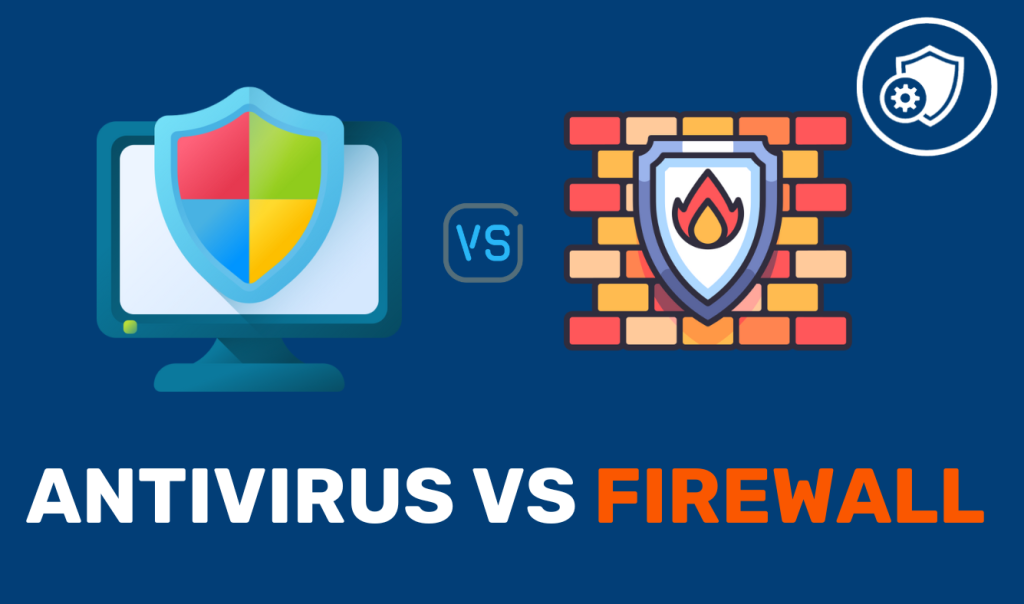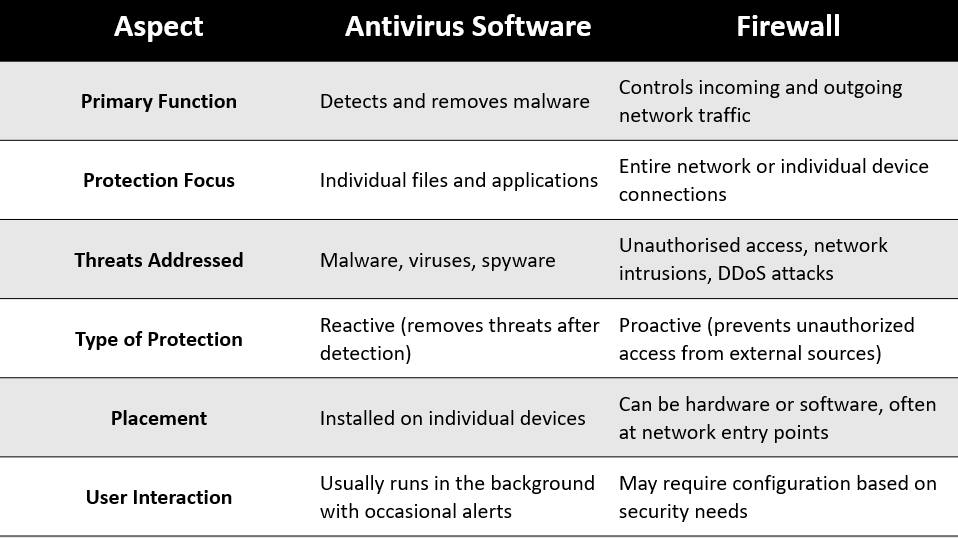Two fundamental components of a comprehensive cybersecurity strategy are Antivirus Software and Firewalls. While they share the common goal of securing your digital environment, they operate differently and serve unique purposes.
Here’s a comprehensive look at the distinctions between antivirus software and firewalls, their functions, and why both are essential for a layered approach to Cybersecurity.

What is Antivirus Software?
Antivirus software is designed to detect, prevent, and remove malicious software (malware) from a device. Malware includes viruses, worms, spyware, ransomware, and other types of harmful code that can compromise the integrity, confidentiality, and availability of your data.
Key Functions of Antivirus Software:
- Malware Detection and Removal: Antivirus software scans files and applications to identify malware and quarantine or delete harmful code before it can cause damage.
- Real-Time Protection: Modern antivirus software continuously monitors files, downloads, and running programs to detect suspicious behavior as it occurs.
- Automatic Updates: Antivirus programs regularly update their malware definitions to recognize new types of threats, staying current with evolving cyber threats.
- Behavioral Analysis: Advanced antivirus software uses behavioral analysis to identify unusual activities that may indicate malicious intent, even if the malware is new or previously undetected.
- System Scanning and Cleaning: Periodic scans are conducted to identify and remove malware that may have been missed during initial monitoring.
Types of Antivirus Software:
- Standalone Antivirus: Primarily focused on detecting and removing malware.
- Internet Security Suites: Comprehensive packages that may include additional tools like parental controls, firewall settings, and privacy tools.
- Endpoint Protection: Designed for businesses, this antivirus software protects all networked devices and is centrally managed for consistent security across the organization.
What is a Firewall?
A firewall is a network security device or software that monitors and controls incoming and outgoing network traffic based on predetermined security rules. Firewalls are a barrier between a trusted internal network and untrusted external networks, like the internet.
Key Functions of a Firewall:
- Traffic Monitoring: Firewalls analyze network packets to monitor who or what is trying to access your network.
- Access Control: They establish rules that dictate which traffic is allowed or blocked, providing a filter against unauthorized access.
- Network Segmentation: Firewalls help segment different parts of a network, isolating sensitive areas from general access.
- Intrusion Prevention: Advanced firewalls can identify and block intrusion attempts based on suspicious traffic patterns or known attack vectors.
- Protection from Unauthorized Access: Firewalls prevent unauthorized users from gaining access to private networks connected to the internet.
Types of Firewalls:
- Packet-Filtering Firewalls: These firewalls inspect packets of data and block them based on source and destination IP addresses, protocols, or ports.
- Stateful Inspection Firewalls: They monitor the state of active connections and make decisions based on the context of the traffic.
- Proxy Firewalls: These firewalls act as intermediaries between end-users and the resources they wish to access, providing an extra layer of anonymity and protection.
- Next-Generation Firewalls (NGFW): Incorporate advanced features like intrusion prevention systems (IPS), deep packet inspection, and application awareness.
Key Difference Between Antivirus Software and Firewall

Why Both Antivirus Software and Firewalls are Essential
While antivirus software and firewalls serve different purposes, they complement each other in providing comprehensive security.
Here’s why both are necessary:
- Layered Defense: Antivirus software protects against malware threats within the device, while firewalls control access to and from the network, creating a layered defense that improves overall security.
- Blocking External and Internal Threats: Firewalls prevent unauthorized users from accessing the network, while antivirus software protects from internal threats that may bypass the firewall.
- Real-Time Threat Detection and Prevention: Firewalls prevent harmful traffic from reaching your devices, but if malware does get through, antivirus software can identify and eliminate it.
- Comprehensive Security for Business Environments: In corporate settings, combining firewalls with endpoint protection (advanced antivirus) ensures that all networked devices and data are secure from both online threats and network intrusions.
Choosing the Right Solution for Your Business
When considering antivirus software and firewalls, selecting tools that match your specific needs is essential.
Here are some factors to consider:
For Antivirus Software:
- User Requirements: Basic antivirus may suffice for individual use, while businesses may need enterprise-grade endpoint protection.
- System Compatibility: Ensure the antivirus software is compatible with your operating system and other software tools.
- Advanced Features: Look for options with real-time protection, behavioral analysis, and frequent updates.
For Firewalls:
- Network Size and Complexity: Smaller networks may benefit from basic firewalls, while larger, complex networks may need advanced firewalls like NGFWs.
- Scalability: If you’re expecting network growth, choose a firewall solution that can scale with your business.
- Intrusion Prevention Capabilities: Next-Generation Firewalls are ideal for businesses needing robust protection against sophisticated attacks.
Building a Strong Cybersecurity Foundation
Both antivirus software and firewalls play crucial roles in defending against cyber threats. Antivirus software offers direct protection against malware and internal threats, while firewalls guard against unauthorized access and external threats, ensuring safe data transfer and network integrity. By implementing both tools, individuals and businesses create a balanced cybersecurity approach that guards their systems from both ends.
When paired together, these security solutions form a robust defense, protecting your devices, data, and network. For any business or individual looking to secure their digital environment, investing in quality antivirus software and a reliable firewall is a critical first step toward safe and secure operations.
Contact Creative Networks Today
At Creative Networks, we understand that cybersecurity is multi-faceted and requires the right tools. Our team can help you design and implement a cybersecurity strategy that combines the best antivirus software with powerful firewall solutions tailored to your business needs.
Contact us today to start building a safer, more resilient digital environment.




